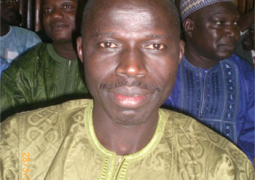Karamo Sanneh, the plaintiff, sued the GTU at the tribunal for wrongful termination of his service.
Mr Sowe was asked by lawyer Marong, the plaintiff’s counsel, whether it was stated in the appointment letter of the plaintiff that you could be redeployed to another organisation to work for that organization.
Sowe told the tribunal that it was not stated in the appointment letter.
He was reminded that it was stated in the appointment letter that the plaintiff should familarise himself with the GTU service rules, and Sowe agreed.
He was asked whether he provided the plaintiff with the service rules, and said the plaintiff was asked to get a copy from the records officer who is under the office of the deputy general secretary, as indicated in the appointment letter.
Further asked whether the appointment letter stated that the plaintiff could collect the copy from the records officer, and he said it was not, but the plaintiff could get it from the office of the deputy general secretary, as indicated in the appointment letter.
Lawyer Marong then asked Sowe whether the plaintiff had made other requests for it.
Mr Sowe said the plaintiff wrote and requested it, and that he responded to the letter.
Sowe added that he could show the tribunal that he replied to the plaintiff’s letter, adding that the plaintiff wrote a petition on 26 March 2012, requesting of the service rules, and he (Sowe) responded on 27 March 2012.
Sowe told the tribunal that the service rules contained the terms and conditions of the service of GTU staff.
He told the tribunal that can provide a copy of the service rules, and lawyer Marong then applied to the tribunal for the witness to produce a copy of the service rules.
Lawyer Marong told the witness that the plaintiff had been requesting the service rules for five years, and it was not provided.
Lawyer Kebba Sanyang objected, and said Lawyer Marong was giving evidence.
Lawyer Marong then re-phrased his question, and asked whether the GTU had taken it upon themselves to produce the service rules to the plaintiff, since the appointment of the plaintiff.
Mr Sowe said every member of staff was asked to get a copy, during GTU meetings.
It was put to the witness that he wrote that the plaintiff had engaged in unscrupulous activities.
Sowe made reference to the plaintiff’s apology letter addressed to the GTU general secretary, in which the plaintiff indicated, among other things, that all his claims against the deputy general secretary and programme officer were false, and he was influenced by Satan.
Mr Sowe further told the tribunal that the plaintiff walked into his office, after the demise of his father, to apologise for his wrongdoing, adding that the plaintiff said that his father cautioned him to be careful about his own attitude, otherwise he would regret it.
Mr Sowe further said a member of staff, who is a cleaner, walked into his office and told him that the plaintiff sent her to the deputy secretary general to apologise on his behalf.
Still testifying under cross-examination, the witness added that, as indicated in the suspension letter dated 30 July 2008, one of the seven reasons for the suspension was the fact that the plaintiff quarreled with one of the drivers over a missing tarpaulin meant for the vehicle of the driver that the plaintiff took home, alleging that it was thrown away.
Lawyer Marong put it to him that he does not know the word ‘unscrupulous’ but the witness said he knows, and that the suspension letter stated “unscrupulous” attitude.
Asked what wrongdoing the plaintiff apologized for, Sowe said it was indicated in the suspension letter dated 30 July 2008, that the plaintiff was misusing the telephone calls and that 40 per cent of the cost of the bill for January and February 2008 was one of the complaints against the plaintiff.
Mr Sowe added that the plaintiff also wrote a petition on 18 December 2009, purportedly on behalf of his colleagues, and when his colleagues were engaged concerning the petition, they said they were not aware of the said letter.
Lawyer Marong asked him whether it was true that GTUCCU wrote to the GTU complaining about the plaintiff’s professional conduct at work, and Mr Sowe said it was true.
It was put to the witness that the complaint from the GTUCCU was from another organization, which did not employ the plaintiff, but Sowe denied this.
Asked whether the plaintiff was working for GTU or employed by Gambia Teachers’ Union Cooperative Credit Union, Sowe said the plaintiff was working for GTU.
He said he made available the letter written by GTUCCU to the plaintiff, to respond concerning the complaints, adding that the plaintiff was engaged on the matter and was transferred from that section.
He further said the GTUCCU is an organ of the GTU.
Lawyer Marong asked the witness whether GTUCCU and GTU are the same, and he responded in the positive.
He was asked whether he asked the plaintiff to apologise concerning the letter from GTUCCU, and he answered in the negative.
Asked whether he gave the plaintiff the opportunity to write and explain about the allegations, Sowe answered in the positive, adding that the plaintiff was engaged on the matter and it was up to the plaintiff to write or otherwise.
Lawyer Marong said Sowe does not have any iota of knowledge about administrative procedures, and Sowe said this was not correct because he has a diploma in management, as well as a Commonwealth professional fellow and queen’s diamond award, and had acquired practical knowledge and skills in administration.
Asked whether he was familiar with Public Service regulations and General Orders, Sowe said he is.
Asked whether it was not normal procedure to write to the plaintiff to react, in the field of administration, Sowe said it was not necessary.
Lawyer Marong told Sowe that he was running the GTU like an authocrat, but he denied this.
The case was adjourned to 31 March and 1 April 2015.



